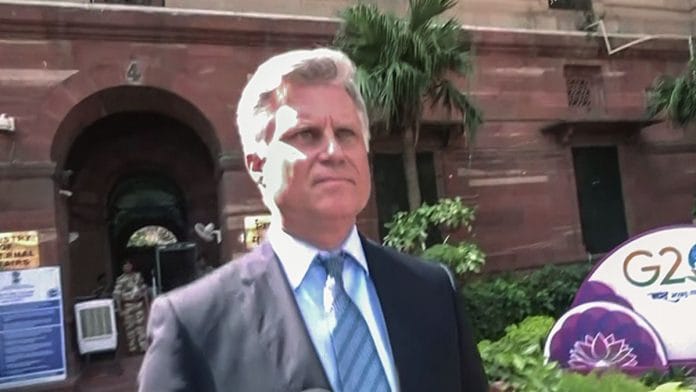New Delhi: Canadian High Commissioner to India Cameron MacKay has criticised a float depicting the assassination of Indira Gandhi at a parade in Brampton, Canada, on 9 June.
Days earlier, there was a similar float outside the Indian consulate in Vancouver at a protest marking the 40th anniversary of Operation Bluestar.
This is the second year in a row that tableaus of this kind at parades organised by Sikh separatists in Canada have made headlines. Last year, External Affairs Minister S. Jaishankar criticised Canadian authorities for giving space to such demonstrations.
“The Government of Canada is aware of further imagery displayed in Brampton on Sunday. Canada’s position is clear: The promotion of violence is never acceptable in Canada,” the Canadian High Commissioner said in a statement on X Tuesday.
Top officials in the Prime Minister Justin Trudeau-led Canadian government, including Minister of Public Safety, Democratic Institutions and Intergovernmental Affairs Dominic LeBlanc and Indian-origin MP and Treasury Board President Anita Anand, have criticised such imagery.
“The use of violent imagery in relation to Prime Minister Indira Gandhi is disturbing and unacceptable as it promotes and perpetuates hate and violence,” Anand said.
Videos have emerged online of the 9 June Brampton parade, where another tableau depicted the murder of General A.S. Vaidya (retd.). General Vaidya, the Chief of the Indian Army in 1984, planned and organised Operation Bluestar, leading to the removal of Sikh militant Jarnail Singh Bhindranwale and others from the Golden Temple.
In 1986, two years after the military operation, Harjinder Singh Jinda and Sukhdev Singh Sukha of the Khalistan Commando Force assassinated General Vaidya in an act of revenge.
Tensions between Canada and India continue to be high after Trudeau accused Indian agents of playing a role in the killing of Sikh separatist and Canadian citizen Hardeep Singh Nijjar in British Columbia last year. Canadian authorities recently arrested four Indian nationals on murder and conspiracy charges in connection to the case.
Speaking with ThePrint last Saturday, India’s High Commissioner to Canada Sanjay Kumar said that none of the four Indian nationals requested legal assistance nor consular access from the Indian mission.
He added that Canada has also not shared “any specific and relevant information” on the potential link between Indian agents and Nijjar’s killing.
Separately, a Canadian parliamentary report recently accused India of funding domestic political parties to influence Ottawa’s electoral process and lobbying for New Delhi-friendly policies, especially on the issue of Sikh separatists.
Previously, India has denied these claims, arguing that it is Ottawa that has interfered in New Delhi’s affairs.
(Edited by Madhurita Goswami)
Also read: Amritpal, Sarabjeet Singh Khalsa — Sikh radicals’ poll victories pose challenge for Mann govt






